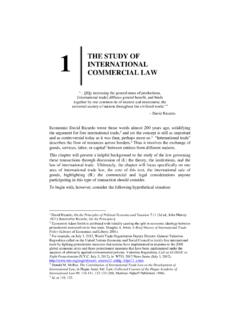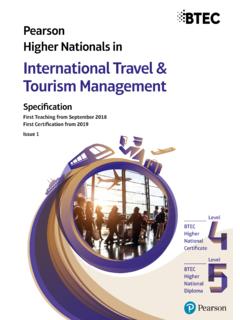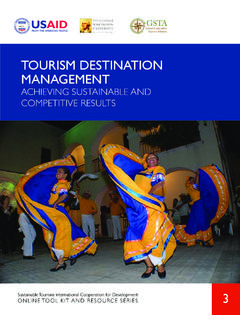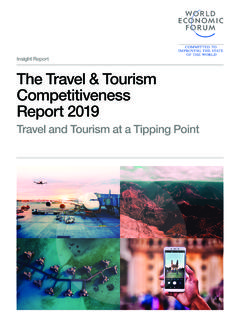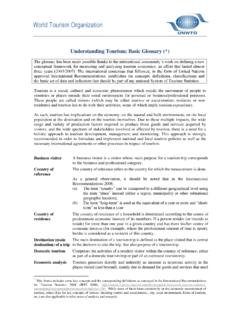Transcription of ECOTOURISM, POLICY AND PRACTICE
1 ecotourism , POLICY AND PRACTICE : Including a Case Study from the Maya Forest Submitted by: Wendy Rubinstein, Candidate Mariana Valdes-Fauli, Candidate Kevin Gould, Candidate Tauheed Khan, , Candidate University of Florida Conservation Clinic Thomas T. Ankersen, Director I. Introduction A. Overview of the tourism Industry tourism , the single largest industry in the world, accounts for one third of all international trade, and many view tourism as a vehicle for economic The World tourism Organization reports that 625 million international travelers spent US$ billion in travel related costs excluding airfare in Furthermore, the ecotourism Society projects that over the next two decades arrivals will increase by and receipts will climb by Late twentieth century phenomena like an increase in wealth, an increase in the number of retired persons with income to travel.
2 Transportation improvements, and technology improvements all contributed to the growth in the tourism Within the rapidly expanding tourism industry, the fastest growing sector is ecotourism is growing between and 7. times faster than the rest of the tourism According to the WTO, in 1998, international travelers spent US $48 billion on nature tourism representing approximately ten percent of all international travel Furthermore, in the US alone, 4-6 million Americans travel overseas for nature related tourism 1. See World tourism Organization Report. 1999. 2. See id. 3. See The ecotourism Society, 4.
3 See Fred Bosselman, Craig A. Peterson and Claire McCarthy, Managing tourism Growth: Issues and Applications, at 7 (1999). 5. See id. 6. See 7. See World tourism Organization Report. 8. See Hawkins and Khan, ecotourism opportunities for developing countries, in Global tourism , 191-204 (1998). According to the ecotourism Society, 30% of all tourists today are ecotourists, which suggests that this sector of the industry generates approximately US $145 Trends analyzed from World tourism Report, 1999. The ecotourism Industry Although alternative definitions for ecotourism abound, most experts agree that ecotourism must meet the following general criteria: Promote biodiversity conservation Contribute to local sustainable development goals 9.
4 See Bring profits to the participants 10. 10. See Ron Mader, Latin America's new ecotourism : What is it?, bridging borders across the americas. Costa Rica has been widely recognized as a model for enabling an ecotourism POLICY environment because of its infrastructure development, public and private participation and open market economy. Costa Rica's government passed a tourism incentive law providing developers of hotels, car rental agencies, and tour operators a 12-year moratorium on taxes in return for investment in the country's tourism industry. More recently, the country's tourism ministry established the first government sanctioned tourism certification In addition, other countries like Brazil (Amazon, Pantanal), Argentina (Patagonia), Belize and Indonesia (Bali) have provided capital incentives to those investors who preserve ecologically sensitive land and coastal resources.
5 Although the financial requirements for ecotourism projects are similar to those of other commercial projects, the potential yields of ecotourism may not equal the highest premiums that investors reap from other tourism investment opportunities. Nevertheless, ecotourism projects can contribute to conservation objectives and human resource development in host With the exception of micro-enterprises on one hand and a few very large projects on the other, green ventures in Latin America require debt-equity participation of between US$100,000 to US$5 The key to successful investment lies in selecting projects with the help of local non- government organizations (NGOs) and communities, seeking public / private joint ventures, and obtaining grants and low interest loans from financial institutions.
6 According to research, western tourists are now seeking alternatives to traditional tourism14. Instead of taking traditional mass tourism oriented vacations, many tourists are now seeking new, less visited As a result of the growing concern with environmental and cultural issues, tourists are now demanding vacations in pristine environments with uncorrupted local culture. 16. These factors contribute to an increased demand for development, creating an environment of investment in the infrastructure projects necessary to sustain tourism . 11. See Christie Pashby, Sustainability' Can Work, Costa Rica Shows World, The Tico Times, January 28, 2000, at 6.
7 12. See Sweeting et. al. The Green Host Effect: an integrated approach to sustainable tourism and resort development, Conservation international POLICY Papers, 103 (1999). 13. See id. 14. See I Munt and E. Higinio, Sustainable tourism , Belize: ecotourism Gone Awry, at 98 (1997). 15. See id. 16. Id. A variety of factors contribute to the growth of ecotourism . For example, some East Asian and Latin American governments have adopted policies to induce capital investment in ecotourism . In addition, NGO's, industry associations, and POLICY makers are developing guidelines and certification standards to ensure uniform development of the industry.
8 ecotourism experts suggest that a system of voluntary certification will help consumers to choose legitimate ecotourism enterprises. However, such a system will work only if business leaders insist on high certification standards. B. The Road Traveled This study focuses on the development of ecotourism POLICY and its application to the tri-national region of Southern Mexico, Guatemala and Belize, often called the Maya Forest. Although there are many different areas that relate to ecotourism , this study addresses four topics of relevant interest. The first section explores various definitions of ecotourism and related terms describing non-traditional tourism .
9 This study hopes to identify the different aspects of non-traditional tourism , and differentiate ecotourism from those definitions. In addition, the study suggests seven characteristics of ecotourism to consider when adopting a definition for this type of tourism . The second section presents an overview of currently existing ecotourism certification systems, especially those in Central America and the Maya forest region specifically. This section describes and analyzes these systems in the context of emerging development in the area of green certification or ecolabeling.. Third, the study explores past, current and proposed initiatives and governmental policies in the Maya Forest countries.
10 In particular we examine whether governments are providing useful and effective policies on ecotourism . Finally, we review government POLICY that encourages the conservation of private lands, an especially powerful ecotourism incentive. In addition, the study provides a description of private land conservation options. II. The Definitional Dilemna Although its economic, social and conservation contribution to sustainable development are highly touted, tourism industry professionals are unable to ascertain ecotourism 's actual contribution to the tourism Part of this difficulty stems from the confusing array of definitions offered by ecotourism POLICY specialists.
